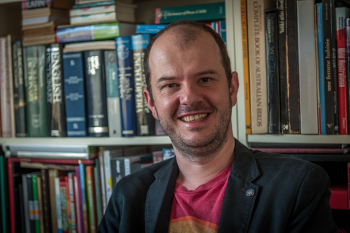On the following link you can download the Book of Abstracts of the 24th DRZB 2019. The book includes only those papers that were delivered at the conference.
We are proud to announce that the first keynote lecture following the conference opening ceremony will be held by our alumna, Professor Radmila Prislin from San Diego State University, USA. It is also a great pleasure and honour to announce that two additional keynote lectures will be held during the conference by Professor Fabrizio Butera from the University of Lausanne, Switzerland and Associate Professor Zvonimir Galić from the Department of Psychology at the Faculty of Humanities and Social Sciences in Zagreb.
Social psychological research on minority influence has focused on the cognitive responses to minority advocacy. Important as these responses may be, they are only an intermediary between the advocacy and its ultimate goal of social change whereby minorities become majorities and vice versa. What are the effects of social change on group dynamics? Judging by lack of attention to this question, social psychology seems to subscribe to the adage that the more things change, the more they stay same: Minorities switch place with majorities but the group as a whole remains the same. The gain-loss asymmetry model guiding this program of research postulates the opposite: Because negative reactions to loss of the majority position are stronger than positive reactions to gain of the majority position, the resultant net negative outcome weakens the group. Series of studies probed the postulate in groups in which experimentally created, opinion-based minorities and majorities either remained stable during the entire course of interaction or reversed their positions as a result of successful minority advocacy. Social change rendered groups volatile as both majority and minority factions detached from the group as a unifying entity, preferring to cease mutual interactions, which became adversarial when former minorities and majorities could not avoid each other. Although these social costs of change diminished when former minorities were assured of their newly won majority position, groups are well advised to institute mechanisms that regulate post-change volatility. Such self-correcting mechanisms would ensure that groups are shielded from the social costs of change while potentially capitalizing on the minorities’ capacity to innovate.
 Radmila Prišlin is Professor of Psychology at San Diego State University, where she currently serves as Associate Vice President for Academic Affairs. She received her graduate training at University of Chicago and University of Zagreb in her native Croatia, where she received PhD in social psychology under the mentorship of Professor Slavko Kljaic. Prior to accepting position at San Diego State University, she served on the faculties of University of Zagreb and Texas A&M University.
Radmila Prišlin is Professor of Psychology at San Diego State University, where she currently serves as Associate Vice President for Academic Affairs. She received her graduate training at University of Chicago and University of Zagreb in her native Croatia, where she received PhD in social psychology under the mentorship of Professor Slavko Kljaic. Prior to accepting position at San Diego State University, she served on the faculties of University of Zagreb and Texas A&M University.
Radmila Prislin’s research interests span a number of areas including attitudes and persuasion, social influence, and group dynamics. Her focal research program elucidates social change effected by successful minority influence and the resultant dynamics in groups where minorities become majorities and vice versa. Her work has been published in some of the premier outlets in the field, including Annual Review of Psychology, Journal of Personality and Social Psychology, Personality and Social Psychology Bulletin, Experimental Social Psychology, European Review of Social Psychology, and European Journal of Social Psychology. Among others, her research has been funded by National Science Foundation (USA) and Leverhulme Trust (UK). Radmila has served as Editor of European Journal of Social Psychology. She is Fellow of the Association of Psychological Science. Radmila has mentored numerous students who now have thriving careers in academia and industry at all inhabited continents.
Grading is a pervasive feature of assessment from primary to higher education, and its effects have been widely studied. In this talk I will report on a research program that has studied the effects of grading at different levels, on intra-individual (motivation and goals), intra-group (information sharing), inter-group (social classes) and structural (selection) processes. I will discuss a possible articulation of these levels.

Photo by Felix Imhof, UNIL
Fabrizio Butera is Professor of Social Psychology at the University of Lausanne, and Director of the Social Psychology Laboratory (UNILaPS) of the same University. He is past President of the European Association of Social Psychology, and former Member of the Research Council of the Swiss National Science Foundation.
His research is concerned with the study of social change, from the structural processes founding social influence (power, norms, interdependence) to the cognitive and motivational mechanisms that determine individual change. Within this framework he has studied for example how the type of assessment determines motivation and learning at school, how societal norms intervene in shaping the definition of motivation, how cooperation and competition affect anti-social behavior, and how discrimination in terms of gender and social class emerges from the way the educational system is structured.
Zvonimir Galić: Assessing the Unconscious: Contribution of Implicit Personality Measures to the Understanding of (Organizational) Behaviour
Work and organizational psychology research largely relies on self-report instruments where participants self-report about their attitudes, emotions and behaviors. In some aspects of the field, such as the relationship between personality and organizational behavior, overreliance on self-reports may lead to limited understanding of organizational behavior because respondents are either unwilling or unable to self-report about their psychological processes. Recently developed methods for implicit personality assessment might offer new insights into organizational behavior research. Within this presentation I will describe the conditional reasoning tests and implicit association tests, and describe the main findings of our research program where we used the approaches to assess aggressiveness and power motive, important determinants of workplace deviance and leadership behavior.
 Zvonimir Galić is an associate professor of industrial and organizational psychology at the University of Zagreb, Croatia. His main research interests relate to the relationship between personality and work behavior. His other research interest includes work motivation, leadership and decision making. His research has been published in outlets such as Journal of Vocational Behavior, Personality and Individual Differences, Journal of Personality Assessment, Human Performance, and International Journal of Selection and Assessment. He was visiting researcher at Purdue University, Psychological Sciences (Fulbright’s Postdoctoral Research Award), and the Australian National University, Research School of Management (Endeavour Postdoctoral Research Fellowship). Currently he is principal investigator on the project “Implicit personality, decision making and organizational leadership” funded by the Croatian Science Foundation.
Zvonimir Galić is an associate professor of industrial and organizational psychology at the University of Zagreb, Croatia. His main research interests relate to the relationship between personality and work behavior. His other research interest includes work motivation, leadership and decision making. His research has been published in outlets such as Journal of Vocational Behavior, Personality and Individual Differences, Journal of Personality Assessment, Human Performance, and International Journal of Selection and Assessment. He was visiting researcher at Purdue University, Psychological Sciences (Fulbright’s Postdoctoral Research Award), and the Australian National University, Research School of Management (Endeavour Postdoctoral Research Fellowship). Currently he is principal investigator on the project “Implicit personality, decision making and organizational leadership” funded by the Croatian Science Foundation.
